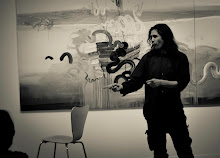The question is often asked - why perform philosophy? What makes you like it so much?
This is a real question for any would be philosopher, and for two reasons. On the one hand the subject, because it has a certain cadence and history, has a real pretension value, that it is well to ward oneself against. To cite Nietzsche or Kant or indeed any bon mots, is enough to look like one knows something or thinks something (a fact that is a personal bete noire of mine). On the other hand, from the perspective of modernity, there is surely a question mark over whether all these thinkers from so long ago, who lived another world, and very different societies, have that much to say to us now. Why should they? And why should we expect them to?
What is more, if you put these two points together, you get a single simple fear - that the study of philosophy is merely ancestor worship for modern times. For where else but in a world of thought do we find our 'thinking ancestors' but in philosophy? Philosophy very easily becomes theology, where a single narrative of 'emerging ideas that changed the world', can be 'seen here in the "pure(est)" form' - which becomes the endless refrain. A form of ancestor worship which makes philosophers its priests, and so called upon to answer anything or everything.
What I suppose gets me down about these philosopher-priests is the assumption of the faith, that in the sacred writings of the philosophers there lie questions (we still are asking) and their (partial and absolute or still relevant) answers; and the authorities are cited safe in the knowledge of this fact.
The trouble of course is that this is simply not true.The history of thought is actually composed of very many questions, some badly formed, some still relevant, but there are also many half questions, or questions we would ask differently, or ones that have slipped in meaning and changed over the years. Likewise the histories contains many answers, many of which we now see as 'solutions' to other questions, or simply try to ignore them or occlude them. What unites the cacophony of different 'takes' on the world are however the minds of their thinkers, who are clearly thinking things out for themselves, and whose logic one can in a sense still follow, in spite of where it is leading. Hence it is the thinker, the named philosopher, who allows one into a world that is quite different from modernity, a difference that in a sense allows you to feel the history of all the time that has passed between the thinker-writer and you the reader.
And yet this weight of time is itself very uneven. Some of the problems of the past cut through to the present, making you see things (perhaps in spite of the thinker themselves) very differently, or just from another perspective, whilst other remain pure history, and it is very clear that their initial thinkers had no idea which would be the case. For me therefore, the study of philosophy is all about changing and partially challenging one's own mental landscape: To read philosophy is to change problems into solutions or older problems, and make modern 'solutions' themselves problematic (i.e. in order to critique it into being a better solution or to show up its unintended consequences for example). It is in short to think, and to be trusted with thought, and not merely given single or simple solutions.
From which it follows that to perform philosophy must always be about communicating, and involving the audience in the endless euphoria of this constantly shifting horizon line. It is to enter the world where ideas are not 'perfect abstractions' or clean simple divinities, but rather messy Greek gods, who endlessly challenge and change one's mind, and have histories and agendas of their own. Agendas which we, latterday Greek heroes, need to understand and navigate, and not escape or hope to master, but rather learn to enjoy and even love. And what could be more dramatic than that? How better to explore it then than in performance? And in answer to the question posed at the start, it is this deep love for difference, and the sharing of a challenge that keeps me thinking, that drags me back to philosophy; that makes me love it enough to perform it.


No comments:
Post a Comment